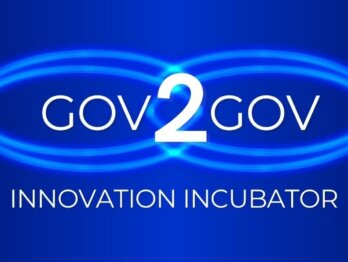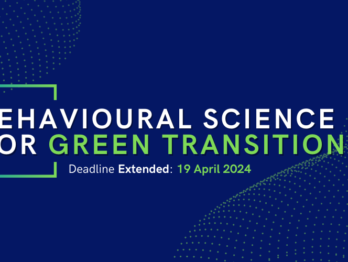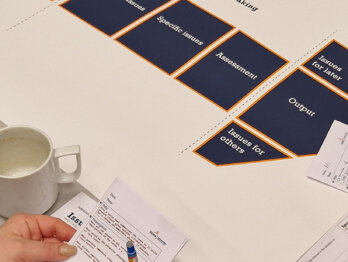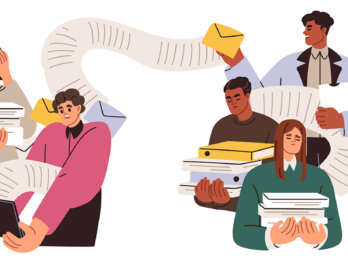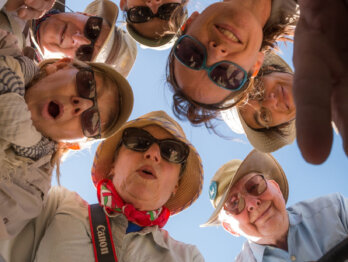Designing Government After Shock: global discussion on the future of government

Co-Design launch of Government After Shock
Last week, together with our partners at Cofluence, we launched the co-design process for the Government After Shock November event. Our vision for this event is not to be a traditional conference presented online, but rather, an opportunity to collaborate, promote global dialogue and use the crises we are experiencing across the world as an opportunity for change. It’s for this reason that co-design is at the heart of this event, and the dialogues and insights discussions that lead up to it. We want to see international collaboration across sectors and segments of society to create a vision and concrete actions to shape the way we “do government” through crisis and beyond. Government After Shock is an opportunity for global dialogue and insights gathering that begins now, but will convene and culminate internationally in an assembly of local, online and networked events from 17 – 18 November 2020.
What is Government After Shock?
Government After Shock came out of two realities: that in-person international conferences are not feasible in the current context, and that we have an opportunity for truly global dialogue to shape how governments emerge from crises and challenges to establish even better governance methods. This isn’t just an event, it is a chance to gather global insights and spark dialogue as we develop visions for more participatory and effective democracy and public services. This will include a series of associated lead-up events in the coming months, which link in insights gathering exercises from around the world leading up to a two-day virtual and networked forum from 17 – 18 November. But the conversation won’t end in November: we hope this will spark future conversations, research, data gathering and insights as we continue to develop better governance frameworks and mechanisms.

Are we ever going to be “after Shock”?
While the event title may be deceiving, we don’t expect to be “after Shock” by November, nor are we just talking about one single crisis or shock. Governments will always face crises. The COVID-19 crisis has been different in one particular aspect – it has been near simultaneous around the world and requires (and delivered) significant changes at rapid pace. This convergence provides an opportunity for shared learning and that many other crises have not. The shared nature of the crisis provides a window, albeit one that has come with high costs, for countries to collectively consider how they engage with crisis, whatever form that crisis might take. Each time a crisis occurs it causes governments and citizens to question the way things are, how they could be, and what needs to change. It’s important to reflect on these things during crises, as it’s too easy to revert back to the status quo and forget the inequalities, injustices and issues that a crisis might have exposed. Government After Shock is intended to challenge us to think about what needs to be left behind, what we want to keep and what things we should do differently.
Making the conversation global and inclusive
We want to create dialogue and generate insights with global and local relevance. In order for this to resonate for participants across diverse regions and contexts, we want to ensure that a range of international stakeholders can shape how the event and conversation unfolds. It’s for this reason that we’ve launched an open co-design process with participants from around the world, representing a wide range of sector actors, including private sector, civil society, academia and beyond.
This co-design has three key components:
- Framing the key themes and topics of the event programme that are most valuable locally and globally
- Shaping core elements of the event model including inclusive participation options across languages, cultures and time zones
- Testing and validating tools and platforms that will support the curation of discussions and insights and the hosting of events
In the first phase of co-design, we had approximately 100 participants representing academia, civil society, regional and national governments, multilateral organizations, public sector think tanks, and private sector organizations. While a large portion of these initial sessions was consumed with an explanation of the event framework, each co-design session revealed a wide range of topics and themes that participants would like to explore throughout these events and conversations. When asked what themes resonated the most, topics such as transformation, sustainable solutions, digital divide, citizen engagement, inequality, reinvention and public engagement surfaced. We hope that the co-design process will help us do develop an event, global dialogue and insights gathering exercise around these themes in a way that is relevant at a local and global level.
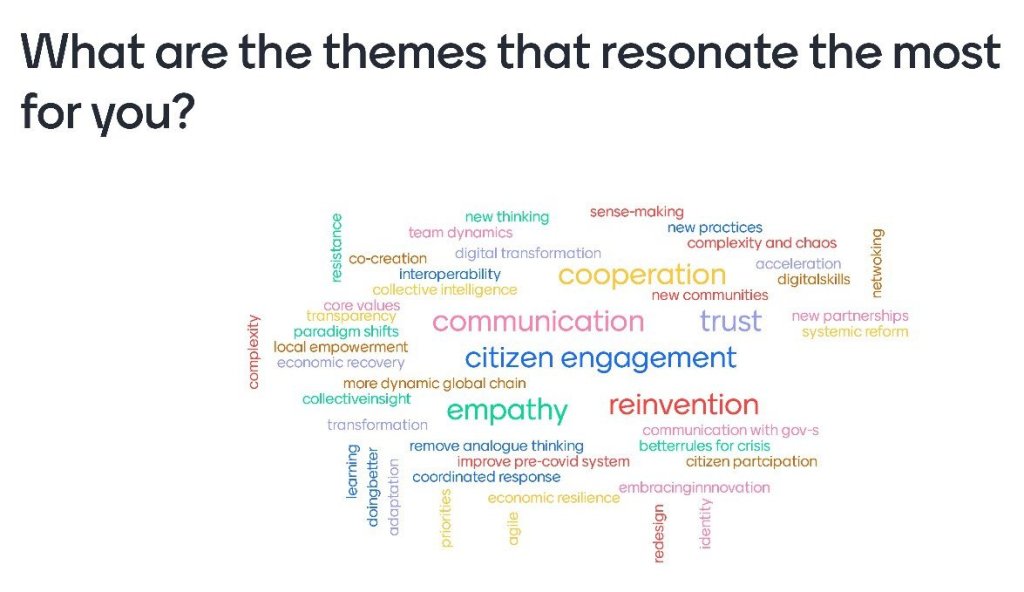
Discussions in these sessions included questions of inequality, and concerns over how we are handling multiple crises at once: including migration issues, social justice, racism and discrimination. Participants also highlighted the importance of learning through challenging times, and shared insights on how such learning could be front and centre of the event. Moreover, we discussed the structures and approaches in the public sector that often result in resistance to change, slow progression and inability to be agile and responsive to changing circumstances. We hope that Government After Shock will produce positive and constructive dialogue, insights and paths forward on how we can improve government to meet modern challenges.
Shaping the conversation
Many of you may be finding yourselves confused: what really is this event? Why are you talking about it now when it’s in November? Is it just another online conference?
We’re starting this conversation now because our goal is not to host a two-day conference and leave it at that. Our goal is that we can start having conversations about the future of government today. While the November forum is being shaped daily by conversations we are having with co-designers, stakeholders, and innovators around the globe, Government After Shock as an initiative has already started.
We want people to start thinking, discussing, sharing, and recording their insights and experiences as they witness government in the face of crisis, but also as they begin to vision how government could be better as it learns and grows from challenge.
In the coming months we will be looping in events on this topic to propel this dialogue, as well as developing methods to gather insights from conversations that are happening around the world. We want to build up and developed the conversation over the next few months around the potential for government; a conversation that will globally convene from 17 – 18 November, but continue before and beyond that date.
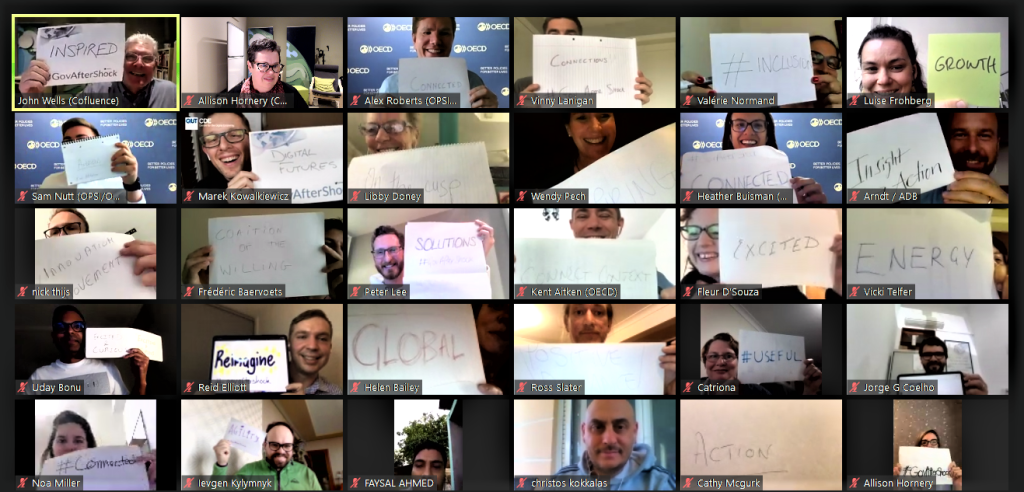
Joining the dialogue
We are excited by the interest we’ve seen across the world in Government After Shock, not only those who wish to participate in November, but also participants that have joined to co-design process or indicated interest in hosting a local event in November. The co-design of Government After Shock will continue over the next month as we work together to shape the conversation. If you are interested in joining this process, we invite you to indicate your interest on our website. In the weeks and months to come we will be sharing more participation options for those who may interested in hosting a local event in November, or who may want to participate in events leading up to the November global forum. We will also be announcing events alongside partners from around the world that will feed into the greater dialogue of Government After Shock. We look forward to working with you to discuss and shape the future of government.
This project has received funding from the European Union’s Horizon 2020 research and innovation programme under grant agreement No. 870913.




